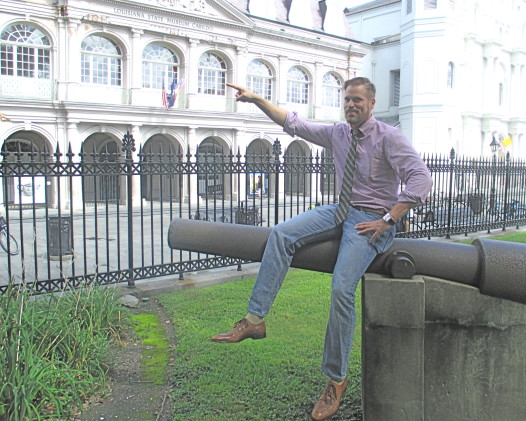
Morgan Molthrop’s (above) book, Andrew Jackson’s Playbook: 15 Strategies for Success, compares Jackson’s New Orleans invasion to modern leadership that contributed to post-Katrina recovery.
When Morgan Molthrop moved back home to New Orleans in 2009, he started reading through volumes in his family’s extensive library.
“I probably read 150 books, spanning 300 years of Louisiana history from the journals of Latrobe to early African-American poetry and Lawrence Powell’s all-inclusive The Accidental City,” he said.
After that intensive study, Molthrop was prepared to help Gray Line create alternative tours of the city before founding his own tour and destination management firm, Custom New Orleans. The former Wall Street investor-relations executive began to view the city’s colorful history through a business strategy lens.
“I realized the city was emerging from Hurricane Katrina in much the same way it had overcome the devastation of two wars. After the Louisiana Purchase, immigrants poured into a boomtown poised for economic success. A few years later, literally at the brink of being overrun by the British Army, the city was saved by pure luck. That same entrepreneurial spirit has been reflected in the concept of Idea Village and in the infrastructure support of GNO, Inc.,” Molthrop said.
One of his favorite historic figures is Andrew Jackson, a brash and charismatic leader who rallied disparate groups to beat an “indomitable” foe against all odds.
Molthrop crafted a business success book, borrowing 15 winning strategies from the renowned U.S. president and military general who won the Battle of New Orleans. A limited, bicentennial edition of Jackson’s Playbook: 15 Strategies for Success is available at a Sept. 9 signing at Octavia Books (513 Octavia St.) and on the bookstore’s website. A second edition will be released citywide in November.
Moltrop theorizes that the very character traits, tactics and determination General Jackson demonstrated in battle are the same characteristics that have helped catapult the city’s post-Katrina recovery.
By interviewing a wide array of notable local sources, including tourism director Mark Romig, Idea Village founder Tim Williamson and developer Pres Kabacoff, Molthrop juxtaposes events from 1815 with those of 2005, demonstrating unconventional attack plans that achieved improbable victories.Since success tips are categorized with military terminology, including shoring up defenses, using guerrilla tactics, acting with bravado and never forgetting the prize, readers reap life lessons along with a series of fascinating history lessons.
For instance, the rough-and-ready American general formed alliances with unscrupulous Baratarian pirates, free men of color, Choctaw Indians, Kaintucks and Creoles, each with singular mettle. Similarly, New Orleans’ post-Katrina revival brought together a motley coalition of business, government and educational leaders, entertainers, tourism and sports promoters – even a Vodoo priestess – to cooperate in an entirely new manner.
With few troops and weapons, Jackson understood the importance of shoring defenses. By buttressing the port of Mobile, he cut off the easiest route for British invasion and forced their ships up the treacherous mouth of the Mississippi.
In 21st century New Orleans, the underlying defense is music – without which the city could perish. So, entertainers Harry Connick, Jr., Branford Marsalis and Habitat for Humanity teamed up to create Musicians Village, providing homes so musicians could get back into the clubs to perform.
After Katrina, the city needed to jumpstart its economy. New Orleans has always been a city of entrepreneurs “because large corporations won’t headquarter in a place with a poor school system and an annual summer evacuation,” Molthrop wryly commented.
Most importantly, in a similar way New Orleans’ post-Katrina recovery has hinged upon a sense of solidarity, Jackson had the charisma to unite diverse groups and convince them to follow his leadership, pledging to die before surrendering to the British. The general’s team approach solidly defeated the Brit’s top-down command structure, slaughtering more than a thousand British troops in less than an hour.
“He’d beaten the army that had beaten Napoleon,” Molthrop writes.
Jackson’s Playbook was designed not only to reflect upon one of the most important battles in U.S. history on its 200th anniversary, comparing its indomitable military leader to modern leaders, but also to help people understand and manage complex issues in their workplaces, neighborhoods and their daily lives.
 NOLAbeings Multimedia artist Claire Bangser created NOLAbeings as a portrait-based story project that marries...
NOLAbeings Multimedia artist Claire Bangser created NOLAbeings as a portrait-based story project that marries...  Voodoo in New Orleans: Reviving history: New Orleans fortune telling This article takes a deep dive into the history of Voodoo in New Orleans, its hybridization with Catholicism, and its present-day place in the city's culture. The author visits fortune-tellers in the French Quarter, using their guidance as a tool for introspection rather than a deterministic predictor of the future. Through her experiences in New Orleans, the author feels a mystical connection to both the past and the future.
Voodoo in New Orleans: Reviving history: New Orleans fortune telling This article takes a deep dive into the history of Voodoo in New Orleans, its hybridization with Catholicism, and its present-day place in the city's culture. The author visits fortune-tellers in the French Quarter, using their guidance as a tool for introspection rather than a deterministic predictor of the future. Through her experiences in New Orleans, the author feels a mystical connection to both the past and the future. 